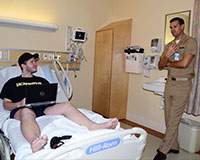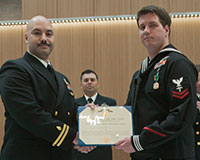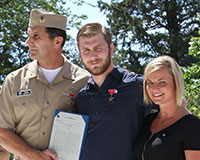Sailors and Coast Guardsmen may self-refer to the program or be referred by family members, command leadership or medical providers.
Mental Health
As needed, Navy Wounded Warrior connects enrollees and their families to non-medical counseling available through various outlets, including the FOCUS program, the Military Family Life Consultant Program, and Military OneSource. These resources offer preventive tools to address issues before they evolve into more serious concerns.
Mental Health Resources to Maintain Psychological Readiness During COVID-19
Bureau of Medicine and Surgery (BUMED) compiled a list of resources on the topics of managing stress, maintaining mental wellbeing, and fostering resilience during the COVID-19 pandemic for Service members, families, leadership, and healthcare providers. Download the file here.
Defense Centers of Excellence
The Defense Centers of Excellence (DCoE) for Psychological Health and Traumatic Brain Injury Outreach Center can provide information about getting treatment for psychological health issues and traumatic brain injury. Trained health resource consultants are ready to talk, listen and provide guidance 24/7 by phone at 866-966-1020, email resources@dcoeoutreach.org or live online chat.
FOCUS (Families OverComing Under Stress) (Active-Duty)
FOCUS bolsters communication and coping skills among families impacted by multiple deployments and the visible and invisible wounds of war. It addresses the family as a whole, taking into account the community they live in and the military support systems at their fingertips. The intervention component of FOCUS allows families to undergo eight to 10 individual training sessions aimed at helping them work through issues. FOCUS representatives look at family history, the source of family distress, and areas of potential change. Families are taught emotional regulation so they can better understand their emotions and how to communicate them, active listening, problem solving, goal setting, and how to manage deployment and combat stress reminders. The goal is to provide families with the tools needed to address issues long after they leave the program.
The FOCUS website allows families to determine if there is a nearby FOCUS Project, or to participate in a web-based training application called “Focus World.” There, people can create an avatar family and go through the program’s components virtually. This virtual application is particularly useful for Reserve or geographically separated military families.
The Military Family Life Consultant (MFLC) Program (Active-Duty)
This program offers service members and their spouses access to licensed, experienced clinical providers who hold master's or Ph.D. degrees. They provide non-medical, short-term counseling for concerns in daily living, such as anger management or parenting issues. Importantly, MFLCs refer situations requiring additional psychological health treatment to appropriate behavioral health agencies.
Conversations are confidential and free of charge. MFLCs work in individual, couple, family or group settings, and they often have walk-in or flexible appointment times and meeting locations. No files or records are kept about interactions with a MFLC.
To find a MFLC, service members and families can contact the DCoE Outreach Center at 866-966-1020.
Military One Source
Military OneSource offers service members and their spouses free, non-medical counseling. It also can refer a service member or eligible family member to a licensed professional counselor in the local civilian community at no cost. Counseling can be conducted face-to-face or over the phone, and addresses non-medical, short-term concerns for up to 12 sessions per issue per person. For more information, call 800-342-9647 or visit Military OneSource.
Helpful Links
- BrainLine.org provides resources on living with and treating traumatic brain injury.
- Military Pathways offers an anonymous online mental health screening.
- The National Center for PTSD includes a wealth of information about the symptoms, diagnosis and treatment of post-traumatic stress disorder.
- TRICARE is the health care program serving service members, retirees and their families worldwide; it offers a host of resources about mental health.
Numquam Navigare Solus – Never to Sail Alone
Sailors and Coast Guardsmen may self-refer to Navy Wounded Warrior, or be referred by a family member, their command leadership or their medical team. Contact the Navy Wounded Warrior call center at 855-NAVY WWP / 855-628-9997, or email navywoundedwarrior.fct@navy.mil.


 Enrollment
Enrollment
 Recovery
Recovery
 Transition
Transition
 Families
Families
 Leadership
Leadership



